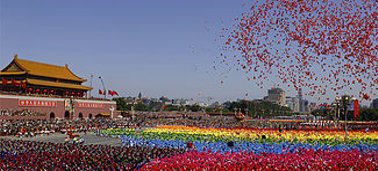Have A Look At
GAY GUIDE TO CHINA
Gay Guide to China. The best gay bars & night clubs, gay rated hotels, gay saunas and massage spas in China including Shanghai, Beijing, Suzhou, Hangzhou, Guangzhou,Xi'an, Shenzhen & Hong Kong.



Gay Life in China
The Chinese word for gay is 同志
The emergence of a highly visible gay community in China over the last decade has been nothing less than astonishing.
Homosexuality is no longer considered a mental disorder as it once was.
Unlike much of the rest of Asia, "gay" is quickly becoming a lifestyle in addition to a behavior in urban areas.
There are bars for both gay men and lesbians in all of the places we work in China.
Being Gay in China
Today, Beijing & Shanghai has a fairly “out” but still – understandably – discreet gay population. Most provincial capitals have one or two gay bars, saunas or clubs.
But generally most activities take place online, thanks to the Internet.
Gay websites are flourishing.
Young people are forming activities groups to organize sport and outdoor events.
Bars and clubs are managing according to the rule of commercial society.
Don't act too surprised if you step into a gay club in Beijing or Shanghai looking almost the same as you might find in New York or London.
After the 2008 Olympic Games in Beijing, the government and the people are not staying much behind international trends.
The first Gay Pride in mainland China took place in Shanghai in 2009, although many of the events were closed down by the authorities. Relatively small scale 2010 and 2011 Gay Pride celebrations proceeded without problems.
Obviously, china is where the largest number of gay population live and they are just as ambitious as any people in creating a good future for their own welfare.
History
The Chinese tradition of male love, like the Greek, has its roots in prehistory.
One of the Chinese terms for male love “Pleasure of the bitten peach” dates back to the Zhou dynasty when around 500 BC the Duke Ling of Wei was offered a peach which Mizi Xia, his favorite, had bitten and found good.
There are many tales of the passion of male nobles for each other, which at the time was considered a time-honored tradition.
Platonic friendships often served as guise of deep affection between consensual lovers.
The Han dynasty (260 BC – 220 AD) continued the tradition of open bi-sexuality, as witnessed by numerous emperors.
The story of Emperor Ai and his favourite, Dong Xian, are the source of the other popular term for male love, "Passions of the cut sleeve".
Dong Xian had fallen asleep across the Emperor's sleeve. When the Emperor wanted to get up, he cut off the sleeve rather than wake his friend.
Traditionally, male singers dressed up to play women roles in Chinese opera, it was also a popular fashion for wealthy gentlemen's to accompany pretty male singers into their bedroom.
This pattern continued throughout the succeeding dynasties, with variations between times of greater tolerance and times of lesser.
The tradition of male love survived until the early years of this century, when it succumbed to the general Westernization of culture and morals.
At this point male love is frowned upon both in Communist China as well as in Taiwan .
It is considered a western import, and against traditional Chinese morals.
Homosexuality in Red China
Under communist party's rule, though not criminalizing homosexuality as former Soviet Union, gays did make it onto The Party's official "hooligan" list - reserved for more "subversive" elements - until removal in 1997.
Likewise homosexuality were officially classed as "mentally ill" until as recently as 2001.
Nowadays China's homophobia doesn't derive directly from religion or cultural machismo (you won't find religious extremists or fascists skin-heads bashing gay people in China), but rather from a control-freakish, mechanistic and strangely soulless State terrified of all aberrations from the norm and from a society yet more obsessed than our own by the notion of family and the duty to reproduce and continue "the family line".
The state reason explains why you don't find any non-governmental gay-right campaigning groups and the nearest you might get to queer activism is in the guise of a HIV prevention health program or support phone-line.
The family reason explains why most middle-aged Chinese gays are married.
But both restrictions blocking the emerging of a mature gay community are loosening as the modern market economy is allowing people more free choices and abilities to live an independent life, and the young generation is eager to take full advantage of this change.
A big Change
China returns to its tolerant tradition towards gays In April, 2001, homosexuality was deleted from the Chinese Classification of Mental Disorders.
In 1997, the deletion of "hooliganism" from criminal codes was considered by many as the de facto decriminalization of homosexual acts.
China has joined a growing number of Asian countries which have rejected outdated Western notions that homosexuality was a mental disorder.
By doing this, China has finally embraced its tradition of tolerance and acceptance towards homosexuality in its long histories.
CHINA GAY
TOURS
Travel Experience Gay China
+0086 137 - 6159 - 2015
hello@chinagaytours.com
HOME
TOURS
ABOUT US
GAY GUIDE
CONTACT US
FAQ
BOOK NOW
BLOG
OVERVIEW CHINA
TRAVEL TIPS
TAILOR MADE TRiP
OUR GUIDES